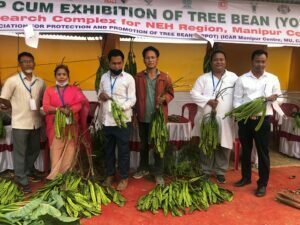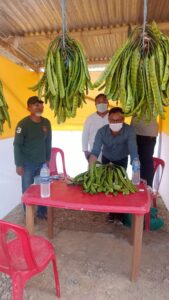During the last few decades, many cases of mass-death of Yongchak have been observed seriously affecting the socio-economic status of the growers. As a result, poppy cultivation is fast emerging as an alternative to Yongchak cultivation in various hill areas of Manipur, says Prof. N Mohilal of Manipur University.
TFM Desk
The inaugural session of the 2-Day State Level Workshop cum Exhibition of Treebean (Yongchak) was held on Tuesday at the ICAR Research Complex for NEH Region, Manipur Centre, Lamphelpat, Imphal.
Dr. VK Mishra, Director, ICAR Research Complex for NEH Region, Umiam, was the Chief Guest of the function. The Guests of Honour included Prof. Pulok Kumar Mukherjee, Director, IBSD, Imphal, Dr. S. Basanta, Director of Instruction, CAU, Imphal, Dr. H. Birkumar Singh, Senior Principal Scientist, CSIR-NEIST, Imphal, Mayanglambam Khelendro, President, AIMS, Manipur, and Dr. T. Brajakumar Singh, Joint Director, Department of Environment and Climate Change, Government of Manipur. The function was presided by Prof. Amar Yumnam, Former Vice-Chancellor, Manipur University.
The Welcome Address was delivered by Dr. I Meghachandra Singh, Joint Director, ICAR, Manipur Centre, and warmly welcomed not only the dignitaries of the function but also the Yongchak growers from different parts of Manipur who enthusiastically participated in the 2-day State Level Workshop cum Exhibition of Treebean.

The Keynote Address was delivered by Prof. N Mohilal Meitei, Head of Department, Zoology, Manipur University, Canchipur. Prof. Meitei stressed that Yongchak (tree bean; Parkia timoriana) is a leguminous multipurpose tree, bearing long and flat edible pods. Traditionally, it has been a highly economical plant with good canopy size of about 30-60 ft. tall. The pod is a favourite and delicious dish for the people of the Northeast India particularly Manipur. The pods are reported to have high nutritional values with about 29-30% protein (seeds). It is a good source of fibres, protein, fats, carbohydrates, minerals and vitamins. It is claimed that it is good to ease depression, anemia; blood pressure; constipation, heartburn and strokes. It is also good for a healthy eye and improves digestion.
Prof. Mohilal added that growing Yongchak can provide a good source of income. However, decline of the precious tree due to various reasons including insect and fungus attack, unavailability of water source, change in ecosystem, reduction of plant pollinated animals like bats and lack of proper management, etc. on a large scale in different parts of Manipur pose a threat to Yongchak cultivation and production. He expressed with concern that local Yongchaks are gradually disappearing from the markets in Manipur.
During the last few decades, many cases of mass-death of Yongchak have been observed seriously affecting the socio-economic status of the growers. The farmers have been compelled to look for alternative means of livelihood. As a result, poppy cultivation is fast emerging as an alternative to Yongchak cultivation in various hill areas of Manipur, said Prof. Motilal. Thus, there is an urgent need for scientific and biotechnological intervention for developing short term and long-term strategies for the propagation, protection and sustainable production of this highly important tree of the state. It is time for the concerned authority to frame a clear-cut policy to fight the decline and to activate all the relevant machineries to save the economy of the state from loss of Rs. 370 crores/annum in importing from Myanmar and from being completely vanishing from the state.
Prof. Mohilal concluded by stating that the purpose of the 2-Day State Level Workshop cum Exhibition of Treebean (Yongchak) is to document the varieties of Yongchak available in the state; to identify the reasons for the decline of local Yongchak in the state, and finally, to design a strategic research and development programme for mass plantations and production to save the plant in the state. He emphasized that the details shall be enumerated in the technical sessions (workshop) in which experts shall deliberate. He suggested that to begin with one can start planting Yongchak saplings on one’s birthday, wedding and other life-cycle events.

Mayanglambam Khelendro stated that Manipur appears to be the largest consumer of Yongchak. And also Manipur perhaps has the highest number of scientists in Northeast India. Despite these facts, none seems to be interested to save the gradually disappearing Yongchak in the state. On behalf of AIMS, he appealed to the gathering that if would-be-brides of the before their wedding shall be one way of popularizing and saving the precious tree. Traditionally, Manipuri did not give expensive gifts to daughters at the time of wedding; the fruits of the trees they planted could be gifted to them when they visit their parental homes. He called upon everyone to collective work towards the conservation and protection of Yongchak.
Dr. H. Birkumar Singh stated that Yongchak is a precious part of the traditional cuisine of Manipur. The fact that pods of Yongchak is very expensive at the beginning of Yongchak but still people buys them is a revealing fact. However, today, Manipur is dependent on import of Yongchak from Myanmar. Therefore, we need to start taking keen interest in conserving the local varieties of Yongchak. He also stressed that yongchak cultivation can help in generating employee avenues for the youths of Manipur and also help in promoting a healthy environment of the state.
Dr. S. Basanta, expressed that Yongchak holds big business opportunities in Manipur. It is important to reduce the volume of import of Yongchak from Myanmar. We need to work in convergent and collaborative mode to save the gradually disappearing precious trees. He suggested including the Yongchak plantation and conservation in the work plans of the Government. This includes study of soil health, identification of parasites, making irrigation system available to Yongchak cultivators.
Prof. Pulok Kumar Mukherjee said that though IBSD has been researching on Yongchak since 2020, there is need for collaborative work and research. He stressed that IBSD has initiated Bio-economy program in which Yongchak has been added for value addition and diversification into the pharma sector. It can be a phyto-pharmaceutical item and also a dietary component. No other crop is as versatile as Yongchak. Therefore, he suggested for protecting the precious plant for health benefit, entrepreneurship and other purposes.
Dr. T. Brajakumar Singh, submitted that he is an agricultural scientist but stated that promotion demands first of all, mass-growing Yongchak. He shared that since 2021 as a part of Government initiative the Department of Environment has started distributing 1000 to 10,000 saplings to the all the 60 MLAs of Manipur. However, the onus of making the plant lies with the growers. He expressed hope that a collaborative efforts amongst various stakeholders can make the venture of promoting and conserving not only Yongchak but also other disappearing plants such Koukha, varieties of u-morok and other precious wild plants.
Dr. VK Mishra stated that Yongchak is an important tree for the whole Northeast. But there is widespread threat on our culture and tradition in India. However, there is hope being shouldered by the women-folk not only for conserving our culture but also our agriculture. One way of conserving our culture including agriculture is an integrated approach forged between the scientific and the social ways. This can equally apply to conserving Yongchak. Science especially bio-technology can add value to Yongchak including enhancing soil fertility. Social aspect is equally important. Since Yongchak is a part of Manipuri culture and tradition sustainable availability lies with the society. In conclusion he remarked that Manipur is a tenacious society and believed that the Manipuri society shall certainly conserve Yongchak.
Prof. Amar Yumnam in his presidential speech stressed that in India’s policy formulation and implementation there has been no meeting point between the various ministries and common people. The same applies to Yongchak. He lamented that the scientists and common people including the farmers have walked disparate paths without meeting eye-to-eye. He appealed that we should not start our venture with Yongchak and end with Yongchak. He elaborated that it has to be comprehensive one in which one is equally aware of the environment, value addition of Yongchak, protect and conserve Yongchak. So, we need scientists from different sectors, environmentalists, animal-rights activists, traders and the common consumers in order to protect and conserve Yongchak. He extended his encouragement to the recently formed Yongchak Kanba Committee and urged to save not only Yongchak but also other precious species including the environment.
During the Inaugural Session, there was release of two training manuals, such as “Post Harvest Management and Value addition”, compiled and edited by Dr. Prabhavati Devi, Dr. K. Levis & Dr. I. Meghachandra Singh, and “Nutritional Garden”, compiled and edited by K. Lily Rangnamei and Dr. Th. Motilal Singh; and finally, a folder entitled, “Kadarnath Poultry, Farming as a Rural Enterprise, compiled and edited by Dr. RK Nirmala Devi.
Dr. Atom Sunil Singh, Director, AIMS, Manipur proposed the vote of thanks.
The Inaugural Session was followed by three technical sessions. In the first Technical Session titled, “Climate Change and Decline of Treebean”, two resource persons presented papers. The first Resource Person was Dr. Brajakumar, Jt. Director, Department of Environment & Climate change, Government of Manipur. He spoke on “Effect of Climate Change on Tree bean”. The second Resource Person, Dr. S.S. Roy of ICAR Manipur Centre spoke on “Therapeutics and Neutraceuticals of Treebean”. The seesion was Chaired by Prof. Amar Yumnam, Former Vice Chancellor of Manipur University.
The second technical session was on the theme, “Soil and Water Management on Treebea”. Two resource persons presented papers. The first Resource person was Dr. T. Basanta Singh, ICAR Manipur Centre. He spoke on “Influence of Soil Health on Tree bean Decline and Remedies”. The second Resource Person, Dr. N. Surbala Devi, CAU, Imphal, spoke on “Role of Moisture Stress on Tree bean”. The session was Chaired by Dr. Brajakumar, Jt. Director, Department of Environment & Climate change, Government of Manipur.
The third technical session was on the theme, “Pests & Diseases of Treebean and Their Management”. It was Chaired by Prof. N. Mohilal Meitei, Head of Department, Zoology, Manipur University, Canchipur. Dr. Kh. Ibohal Singh, CAU, Imphal spoke on “Important Insect Pests of Tree bean” and Dr. Sushilkumar Sharma, ICAR Manipur Centre presented a paper on “Role of Micro-organisms in Tree bean Decline”.
The workshop cum exhibition was held by Association for Protection and Promotion of Treebean; ICAR Research Complex for NEH Region, Manipur Centre, Imphal; Manipur University, Imphal; Central Agricultural University (CAU), Imphal, Manipur; Manipur Organic Mission Agency (MOMA), Government of Manipur; Council of Scientific and Industrial Research – North-East Institute of Science and Technology (CSIR-NEIST), Imphal; Institute of Bioresources and Sustainable Development (IBSD), Imphal, Manipur, National Bank for Agriculture and Rural Development (NABARD) and The Apunba Imagi Machasing (AIMS), Manipur
